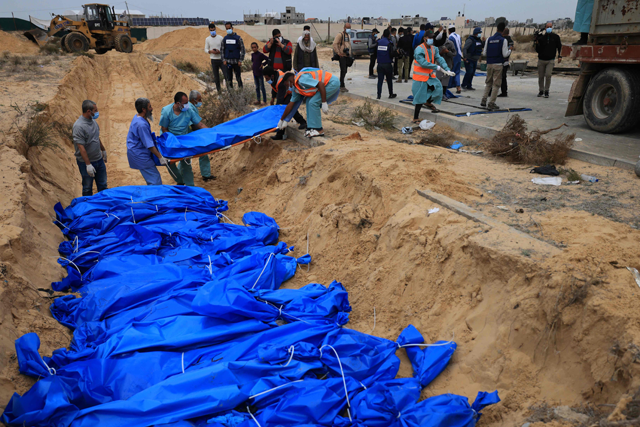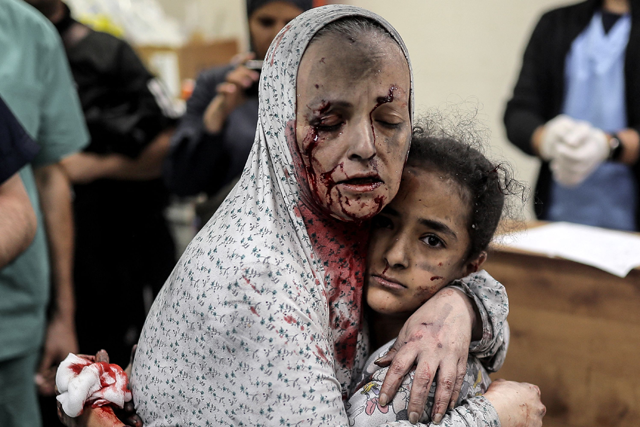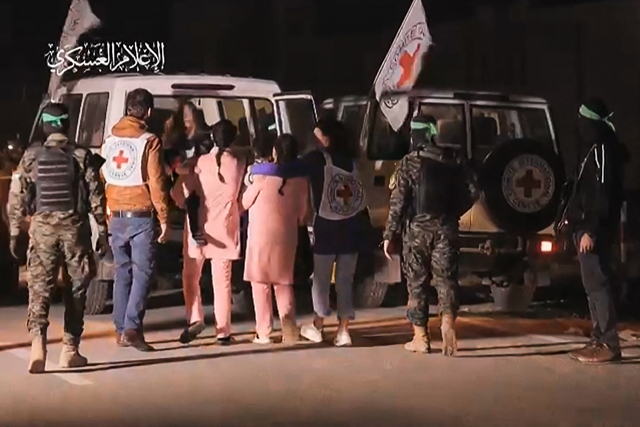You are here
Hamas, Israel agree truce, release of 50 hostages
By AFP - Nov 22,2023 - Last updated at Nov 22,2023

Palestinians bury bodies in a mass grave in Khan Yunis cemetery, in the southern Gaza Strip on Wednesday, amid ongoing Israeli bombardment of Gaza (AFP photo)
OCCUPIED JERUSALEM/DOHA — Israel and Hamas announced a deal on Wednesday allowing at least 50 hostages and scores of Palestinian prisoners to be freed, while offering besieged Gaza residents a four-day truce after weeks of all-out war.
In the first major diplomatic breakthrough in the Israeli war on Gaza, Palestinian fighters will release during a four-day truce 50 women and children.
Qatar confirmed on Wednesday that Hamas and Israel had reached an agreement on a four-day humanitarian pause in exchange for the release of 50 hostages in Gaza.
"The starting time of the pause will be announced within the next 24 hours and last for four days, subject to extension," Qatar's foreign ministry said in a statement.
"The agreement includes the release of 50 civilian women and children hostages currently held in the Gaza Strip in exchange for the release of a number of Palestinian women and children detained in Israeli prisons. The number of those released will be increased in later stages of implementing the agreement," it added.
Qatar has been engaged in weeks of intense, behind-the-scenes negotiations aimed at freeing some of the 240 hostages held in Gaza in return for a temporary ceasefire and access for humanitarian aid.
Qatar said the deal had been undertaken with Egypt and the United States as well as Hamas and Israel and would include "the entry of a larger number of humanitarian convoys and relief aid, including fuel designated for humanitarian needs".
Qatar’s Prime Minister Mohammed Bin Abdulrahman Al Thani wrote on X, formerly Twitter, that the Gulf state hoped the deal would “establish a comprehensive and sustainable agreement” that would “put an end to the war and the bloodshed and lead to serious talks for a comprehensive and just peace process”.
Qatar’s Foreign Ministry spokesman Majed Al Ansari told AFP the release of 50 hostages held by Hamas would be staggered over the four-day truce.
“The truce begins and then every day within the four days we will have a number of hostages coming out... and that number should reach 50 by day four,” he said.
The expectation was that the initial 50 women and children hostages released by Hamas would be followed by further releases to extend the initial four-day truce.
“If by then the Palestinians can commit to an additional number, then the truce can be extended,” Ansari said.
“It will take some time to get all the civilians out within these parameters, it will take some time also to... ascertain how many we have left,” he said.
The temporary cessation of hostilities would not come into effect immediately and would “need some time to be prepared on the ground”, he said.
Hamas released a statement welcoming the “humanitarian truce” and said it would also see 150 Palestinians released from Israeli jails.
“The resistance is committed to the truce as long as the occupation honours it,” a Hamas official told AFP.
Israeli launched a major bombing campaign and ground offensive in Gaza, which, according to the Hamas government in the territory, has killed 14,100 people, thousands of them children.
Israel said that to facilitate the hostage release it would initiate a four-day “pause” in its six-week-old air, land and sea assault of Gaza, while it stressed that the agreement did not spell the end of the war.
For every 10 additional hostages released, there would be an extra day’s “pause”, the Israeli government said.
‘Brave souls’
Sources from Hamas and Islamic Jihad, another group that took part in the October 7 surprise attacks, had earlier told AFP the truce would include a ceasefire on the ground and a pause in Israeli air operations over southern Gaza.
The negotiations have involved the US Central Intelligence Agency, Israel’s overseas spy agency Mossad, Egyptian intelligence, and leaders in Doha, Cairo, Washington, Gaza and Israel.
A senior US official said three Americans, including three-year-old Abigail Mor Idan, were among the 50 earmarked for staggered release from Thursday.
US President Joe Biden said he was “extraordinarily gratified that some of these brave souls... will be reunited with their families once this deal is fully implemented”.
Qatar’s foreign ministry confirmed the deal, saying that “a number of Palestinian women and children detained in Israeli prisons” would be released in exchange for the hostages.
“The starting time of the pause will be announced within the next 24 hours and last for four days, subject to extension,” the ministry said.
Misgivings
Ahead of the Israeli Cabinet vote, Netanyahu had faced criticism from within his right-wing coalition, some of whom thought the deal gave too much to the Palestinian militants.
Hardline Minister for National Security Itamar Ben-Gvir signalled he would vote against the agreement, saying it should include the release of Israeli soldiers also taken by Hamas.
But with dozens of families in Israel who are beyond desperate to have their loved ones returned home, and the Israeli public gripped by the hostages’ fate, the government ultimately set aside any misgivings.
Israel’s hawkish Defence Minister Yoav Gallant said before the crunch meeting that he had won assurances that the deal would not spell the end of the war.
“Immediately after we have exhausted this phase” he said, security operations would “continue in full force”.
In a statement, the Israeli government underscored that the truce agreement would not mean the end of the war in Gaza.
‘Unbearable situation’
Earlier, Gaza resident Hamza Abdel Razeq said he would welcome any ceasefire agreement, hoping it would bring some respite for people who have endured Israel’s bombing and expanding ground offensive.
“The people are really suffering,” he told AFP. “I believe it will pave the way for longer truces or even a total ceasefire.”
A US official said there was also hope that the deal would lead to a “full pause” in fighting along the Israel-Lebanon border between Israel and Hizbollah, which like Hamas is backed by Iran.
Another Gaza resident, Mahmud Abu Najm, said: “We... pray to God for its success because the people are enduring an unbearable situation.”
Large parts of Gaza have been flattened by thousands of air strikes, and the territory is under siege, with minimal food, water and fuel allowed in.
Six weeks into the war, Israel has come under intense international pressure to implement a humanitarian ceasefire.
But in recent days it has pressed its offensive into northern Gaza.
The Israeli military said air strikes had hit “around 250” Hamas targets in the past day, destroying three underground shafts in the Jabalia area, which it said it had fully surrounded.
At Jabalia’s Indonesian Hospital, the Hamas-run health ministry said strikes had killed dozens, but there was no independent confirmation of the toll.
The Israeli forces said later its troops had “directly targeted” the source of fire from within the Indonesian Hospital.
Doctors Without Borders said three doctors, including two it employed, were killed in an Israeli strike on the Al Awda hospital in Jabalia refugee camp.
Israel says Hamas uses medical facilities to hide fighters and as bases for operations, making them legitimate military objectives while insisting it does everything possible to limit harm to civilians.
Related Articles
OCCUPIED JERUSALEM — A temporary truce in fighting between Israel and Palestinian resistance group Hamas has been extended by two days, medi
DOHA — Mediator Qatar said on Tuesday it would use a two-day extension to a humanitarian pause in Gaza to work towards a "sustainable truce"
GAZA STRIP, Palestinian Territories — Hamas is willing to extend a truce for four days and release more Israeli hostages in exchange for Pal














